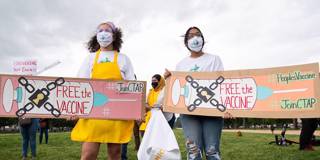 SAUL LOEBAFP via Getty Images
SAUL LOEBAFP via Getty Images
疫苗许可、生产和全球分配
米兰—在新冠疫情的这个时刻,关键问题是疫苗生产能否迅速增加,使大多数人能够相对较快地接种疫苗。但这个问题隐含着另一个问题:在何时以及在什么情况下, 暂停 本国和国际商定的知识产权是适当的。由于美国总统拜登政府出人意料地站出来 支持新冠豁免,世界贸易组织(WTO)正在讨论此事,这暴露出西方政府之间的裂痕。
大多数人都同意,如果说有存在什么条件是应该豁免知识产权的话,新冠疫情肯定符合。数百万条受病毒威胁的生命应该引发一种共同的人性意识。接种疫苗是一项公益,因为每个人的安全最终取决于其他人的安全。在某些情况下,政府与公司共同投资开发疫苗,这加强了强制许可的理由。但是,无论我们采取什么措施来提供豁免,都不得产生可能损害我们对今后此类危机的反应的不利或意外的后果。
我们需要从一个基本问题开始:正在讨论的提案是要放弃知识产权,还是仅仅允许强制许可,根据该许可?在后一种情形中,公司保留其知识产权及从中获取回报的权利。在两者中,强制许可更可取。通过承认创造者有权获得回报,它能够让未来激励不利影响最小化。
https://prosyn.org/X7GyKmjzh
To continue reading, register now. It’s free!
Register Now
Already have an account?
Log in



米兰—在新冠疫情的这个时刻,关键问题是疫苗生产能否迅速增加,使大多数人能够相对较快地接种疫苗。但这个问题隐含着另一个问题:在何时以及在什么情况下, 暂停 本国和国际商定的知识产权是适当的。由于美国总统拜登政府出人意料地站出来 支持新冠豁免,世界贸易组织(WTO)正在讨论此事,这暴露出西方政府之间的裂痕。
大多数人都同意,如果说有存在什么条件是应该豁免知识产权的话,新冠疫情肯定符合。数百万条受病毒威胁的生命应该引发一种共同的人性意识。接种疫苗是一项公益,因为每个人的安全最终取决于其他人的安全。在某些情况下,政府与公司共同投资开发疫苗,这加强了强制许可的理由。但是,无论我们采取什么措施来提供豁免,都不得产生可能损害我们对今后此类危机的反应的不利或意外的后果。
我们需要从一个基本问题开始:正在讨论的提案是要放弃知识产权,还是仅仅允许强制许可,根据该许可?在后一种情形中,公司保留其知识产权及从中获取回报的权利。在两者中,强制许可更可取。通过承认创造者有权获得回报,它能够让未来激励不利影响最小化。